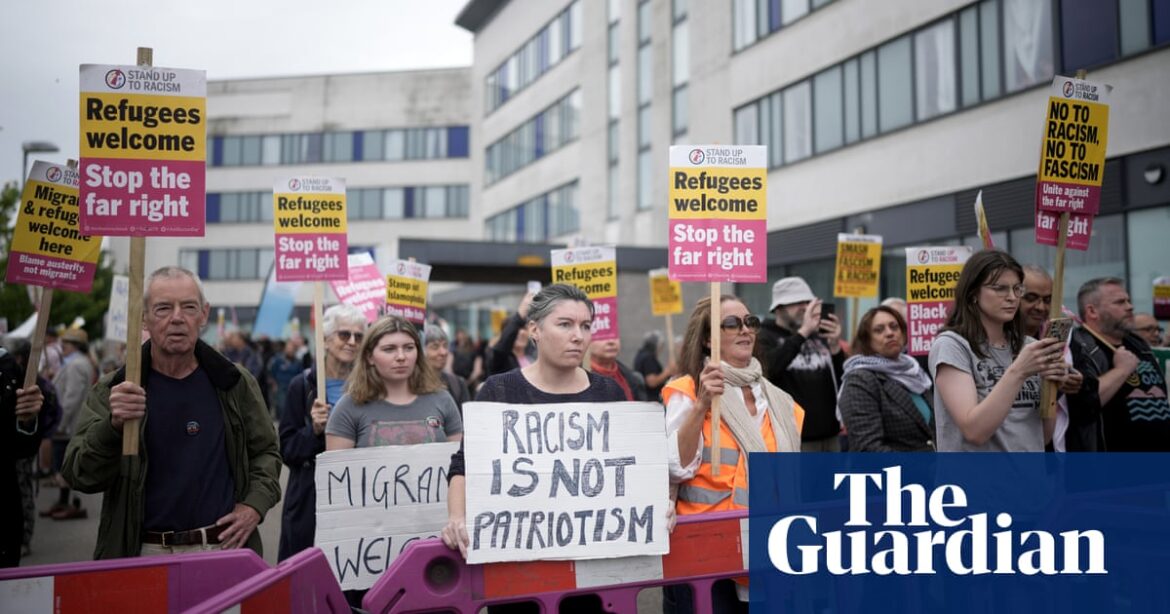
The asylum system would “descend into chaos” if Labour refused to open more hotels for people seeking refuge in the UK, a Home Office minister has told the Guardian.
Angela Eagle, the minister for borders, security and asylum, said officials had been forced to find more private accommodation for new arrivals and blamed the backlog of tens of thousands of cases built up under the last government.
The government’s decision to open asylum hotels despite Keir Starmer’s pledge that he would close them have been condemned by the Tories and Reform.
In Labour’s election manifesto, Starmer said he would “end asylum hotels, saving the taxpayer billions of pounds”.
On Thursday, hundreds of people were removed from the Bibby Stockholm barge and put into hotels across the country.
Asylum seekers were also seen moving into two hotels, in Berkshire and Greater Manchester, after the Home Office received “ministerial approval” to use them.
In her first public comments on the development, Eagle said ministers had no choice but to make the temporary move after discovering nearly 120,000 unprocessed asylum claims after Labour took power.
She said: “It remains our commitment to end the use of asylum hotels and house people in more cost-effective and suitable accommodation in communities. But the size of the existing backlog means we are forced to use hotels in the meantime. This is not a permanent solution. It is a necessary but temporary step to ensure the system doesn’t descend into chaos.
“When this government took over in July, we inherited an asylum system under exceptional strain, with tens of thousands of cases at a complete standstill in a backlog, without their claims processed and a record number of people arriving on small boats in the first half of the year.
“The home secretary took immediate action by restarting asylum processing and scrapping the unworkable Rwanda policy – this will save an estimated £4bn for the taxpayer over the next two years,” she said.
Labour is acutely aware that keeping asylum seekers in hotels can quickly become a toxic issue. During last summer’s riots, several hotels were targeted by far-right activists.
The latest figures from June show there were nearly 30,000 migrants living in more than 250 hotels at a cost of £4.2m a day.
Since then, more than 15,000 people seeking asylum have arrived across the Channel, the majority of whom will have to be housed in hotels.
At the same time, the asylum backlog – the number of people claiming asylum whose cases were yet to be processed – soared over the final months of the Conservative government.
Figures show that there were 118,882 people in the backlog by the end of June 2024 compared with 27,000 in 2018. After Labour scrapped the Rwanda policy, analysis by the Refugee Council found that the backlog was expected to be 118,063 in January 2025 – 59,000 cases lower than if the last government had continued with the same policies.
In effect, the majority of asylum decisions from March 2023 onwards had been stopped under the previous government’s Illegal Migration Act.
after newsletter promotion
To restart processing, Yvette Cooper, the home secretary, laid a statutory instrument that ended the retrospective nature of the act’s provisions, so that the Home Office could start clearing cases.
In the long term, Cooper is seeking homes of multiple occupancy, family properties, former care homes and student accommodation to house asylum seekers.
Turning back to hotels to house asylum seekers in the short term is fraught with risk. Far-right elements targeted hotels housing asylum seekers during the recent unrest.
During the last parliament, constituents’ anger against asylum hotels provoked a backlash against Tory MPs, and proved to be a rallying point for Reform.
After reports last week that more hotels would be opened, the shadow home secretary, James Cleverly, said: “The Tory government closed 150 asylum hotels and had flights ready to go to Rwanda.
“But Labour scrapped our deterrent on day one and are now reopening asylum hotels costing upwards of £4m every day – and breaking yet another promise they made to the British people.”
The Home Office is planning to deliver £200m of additional in-year savings in 2024-25 and £700m savings against 2024-25 levels during the 2025-26 financial year on asylum costs.
These measures taken together would represent a saving of more than £4bn across 24-25 and 25-26 compared with the previous trajectory of spending.
Source: theguardian.com



